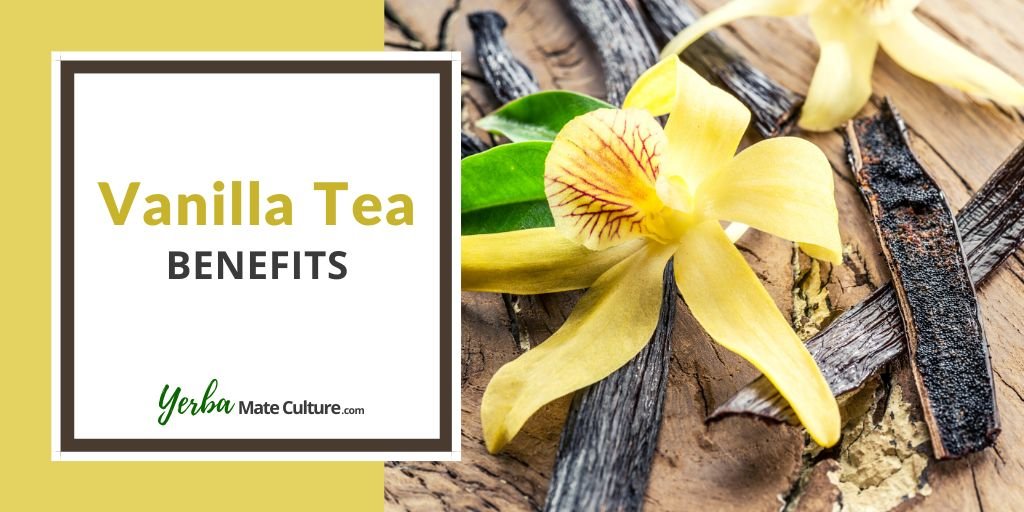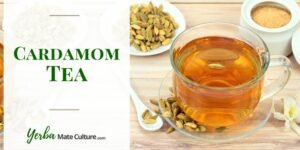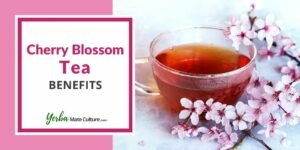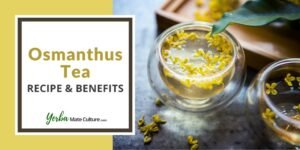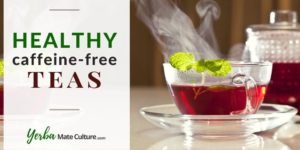Vanilla tea is a delightful beverage that not only tastes great but also offers numerous health benefits to its drinkers. With its rich and soothing aroma, vanilla has the power to transform any ordinary tea into an exquisite, comforting indulgence.
Naturally loaded with antioxidants, vanilla tea aids in combating cell damage caused by free radicals. Drinking it can help in the healing process for burns, wounds, and internal injuries. Beyond that, vanilla is known for its ability to lower stress hormones and improve your mood.
Read this guide to learn more about the health benefits of vanilla tea and how to mix it with different types of tea leaves and herbal ingredients.
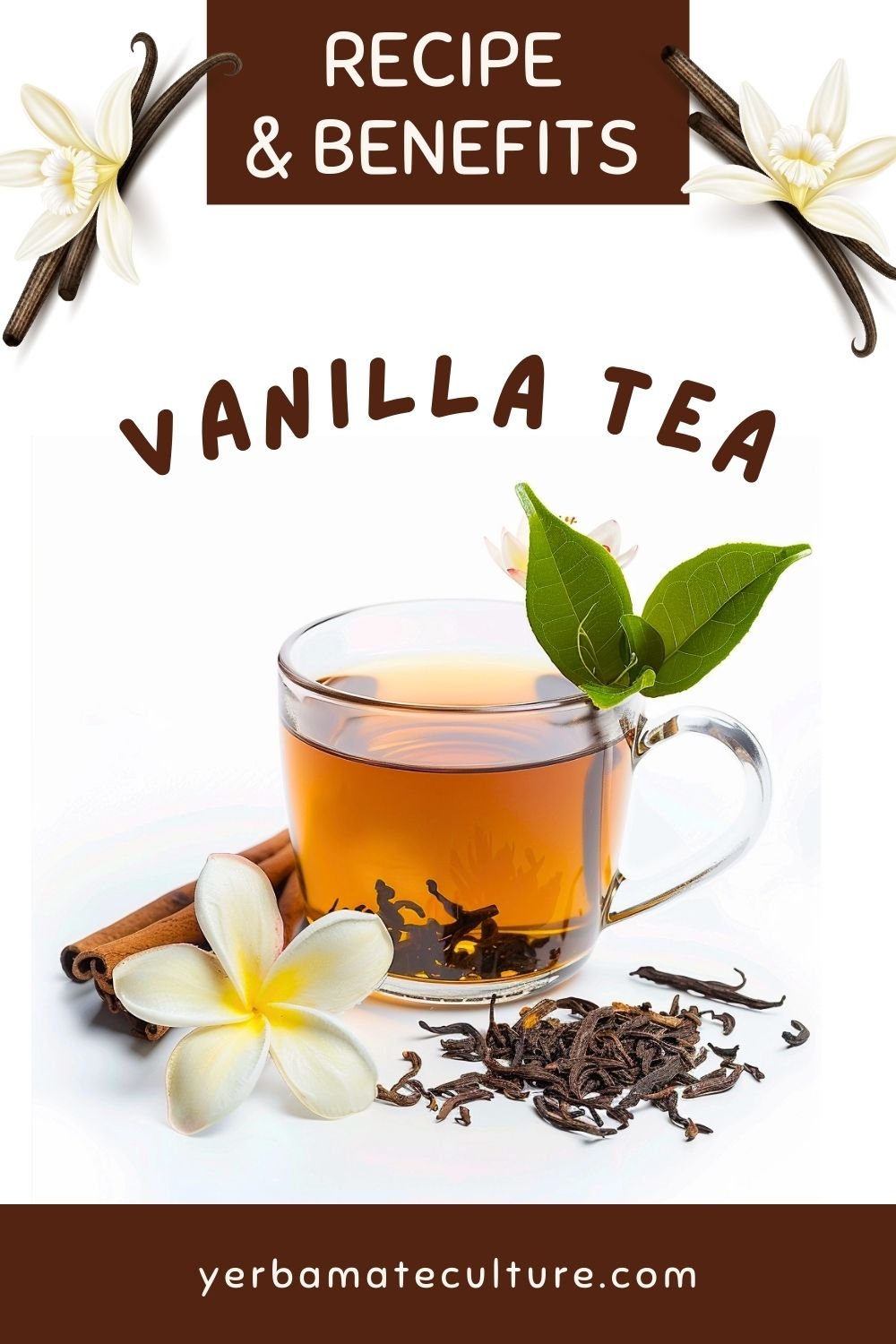
What is Vanilla Tea?
Vanilla tea is a pleasant and aromatic drink that is usually made with a blend of tea leaves and natural vanilla flavoring, which can be derived from vanilla beans or vanilla extract.
The tea is often made using black tea as a base, but it can also be found in green, oolong, or herbal tea blends. Vanilla tea offers a unique and delectable taste that can be enjoyed both hot and cold.
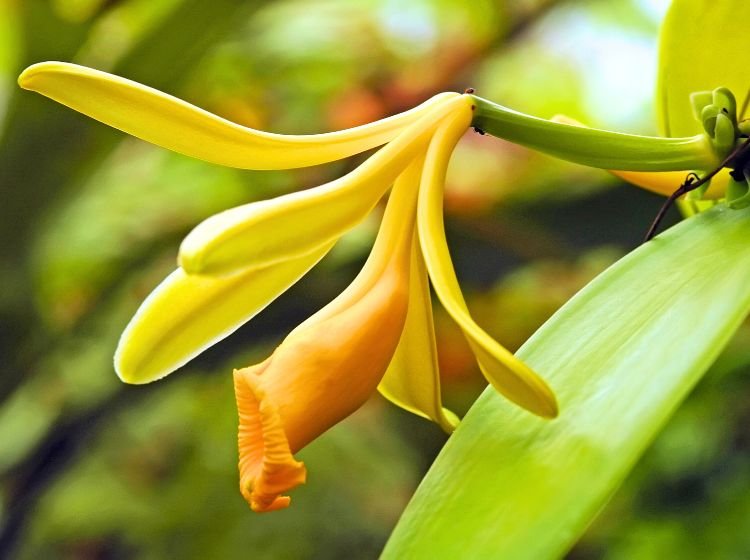
There are over 100 varieties of vanilla orchids but vanilla beans are mostly harvested from one called Bourbon vanilla or flat-leaved vanilla (Vanilla planifolia).
Vanilla beans consist of the pod and seeds of the plant and are predominantly cultivated in Madagascar and its neighboring islands. Vanillin is the main compound responsible for the unique flavor and aroma of vanilla beans.
Starting out green, the tips of vanilla beans start to yellow as they ripen. After they have reached just the right level of ripeness, the beans are picked and go through a complicated curing process.
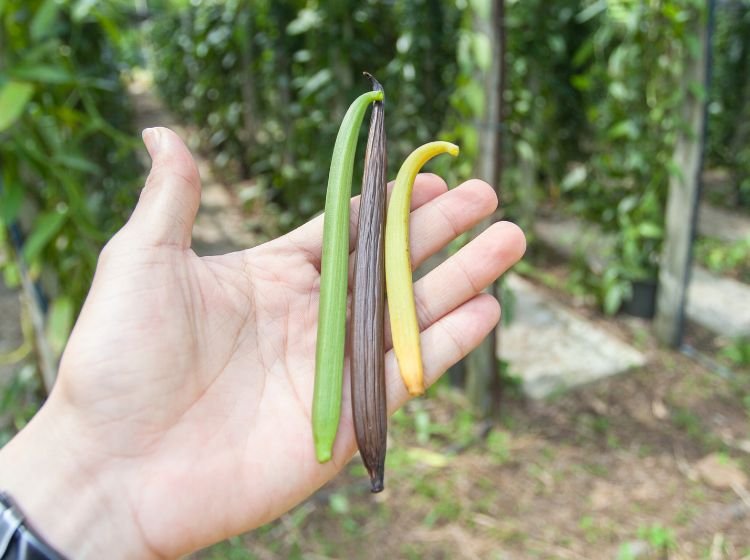
Vanilla Tea Benefits
Not only is vanilla tea a delicious drink, but it also boasts several health benefits, such as kickstarting your metabolism and improving gastrointestinal health. These benefits can be attributed to both the tea leaves and the active ingredient of vanillin found in the vanilla flavoring.
As you sip your tasty cup of tea, take a moment to appreciate these key benefits:
1. Antioxidant Properties
Vanilla tea contains a variety of antioxidants that help to protect your body from free radicals and oxidative stress. These antioxidants can have a positive impact on your overall health and may even slow down the aging process.
2. Anti-Inflammatory Effects
Drinking vanilla tea may help to reduce inflammation in your body. The active ingredient, vanillin, has anti-inflammatory properties that can assist in calming and healing various inflammations.
3. Improves Heart Health
Regularly consuming vanilla tea can support your heart health by promoting better blood circulation and possibly reducing cholesterol levels. This can help prevent heart disease and improve the overall health of your blood vessels.
4. Reduces Stress and Anxiety
The soothing aroma and calming effects of vanilla tea may help in relieving stress and anxiety.
Enjoying a cup of this flavorful tea can provide a relaxing experience that helps you unwind and counteract the negative effects of everyday stressors.
5. Promotes Healthy Digestion
Vanilla tea aids in digestion by improving overall gastrointestinal health. Its active ingredient, vanillin, along with other antioxidants can assist in maintaining a healthy and balanced digestive system.
The antioxidants found in vanilla aid in soothing gut inflammation and may help with other digestive issues like cramping, stomach ache, and diarrhea.
If you want to try other herbal teas to improve digestion, I recommend that you also check out my article about trumpet leaf tea.
6. Supports Weight Loss
Including vanilla tea in your weight loss journey could provide you a boost in kickstarting your metabolism. Drinking vanilla black or green tea is especially effective because these teas are known to help you lose weight.
As mentioned above, vanilla tea can improve your digestive health which is important in slimming down and burning fat more efficiently. In addition, it’s an excellent appetite-suppressant tea because the aroma of vanilla can help reduce your cravings for food.
7. Better Skin Health
Drinking vanilla tea has numerous skin benefits, such as preventing skin damage and accelerated aging due to its antioxidant content.
By adding this fragrant tea to your skincare routine, you can enjoy the benefits of healthier, more vibrant skin.
Nutritional Content of Vanilla Tea
Vanilla tea contains a variety of essential macronutrients, vitamins, and minerals that support your health.
Some of the key vitamins present in vanilla tea include thiamin, niacin, and vitamin B6, which are essential for healthy skin. As for minerals, you will find trace amounts of magnesium, phosphorous, and potassium in this delightful beverage.
Although the calorie content in a cup of vanilla tea may vary depending on the type of tea used and any added sweeteners, it is generally a low-calorie beverage. This makes it an ideal choice for those who are conscious of their daily caloric intake.
How to Make Vanilla Tea
To prepare a cup of vanilla tea, simply steep your preferred tea leaves in hot water, along with a few pieces of vanilla beans or a few drops of vanilla extract. You can adjust the strength and flavor of your tea to your liking by steeping it for a longer or shorter duration.
For an extra touch of sweetness, you may wish to add some honey or sugar, but many enjoy the natural taste without any additional sweeteners.
If you want to make your vanilla tea extra special, follow this recipe:
Ingredients:
- 1 cup of water
- 1 tea bag or 1 teaspoon of loose tea of your choice
- 2 tablespoons of milk
- 1 teaspoon of sugar or raw honey
- 1-inch piece of vanilla bean (or ½ teaspoon of pure vanilla extract)
- 1-inch piece of cinnamon bark (optional)
Brewing Process:
- Bring the water to a boil in a saucepan or a teapot.
- Add the vanilla bean and cinnamon bark and let it simmer for about 5 minutes covered.
- Turn off the heat and add the tea bag or loose leaf tea and brew for another 2 to 3 minutes.
- Gently stir in the milk, and sugar or honey and enjoy!
Savor the warmth and soothing qualities of this delightful beverage, along with the combined benefits of natural vanilla and the antioxidants found in black or green tea.
You can also add other flavorful ingredients that have antioxidants. For example, the floral aromas of cherry blossom mix perfectly with the delicate taste of vanilla. Read my article about benefits of cherry blossom tea to learn more!
Possible Side Effects and Precautions
Vanilla tea is generally considered safe and any negative side effects are very rare. However, it’s always a good idea to be mindful of potential allergic reactions, interactions with medications, and considerations for pregnant and nursing women.
Allergic Reactions
Although rare, some people may experience an allergic reaction to vanilla, particularly if you have a known allergy to other plants in the orchid family.
Symptoms of an allergic reaction can include skin rash, itching, difficulty breathing, or swelling. If you experience any of these symptoms after consuming vanilla tea, discontinue use and consult your healthcare provider.
Interactions with Medications
If you are taking any prescription or over-the-counter drugs, it’s a good idea to consult a healthcare professional before drinking vanilla tea because it could interact with certain medications.
Pregnancy and Nursing Considerations
Limited research exists on the safety of consuming vanilla tea during pregnancy or while breastfeeding. Therefore, it’s best to practice caution and consult your healthcare provider before incorporating vanilla tea into your diet if you are pregnant or nursing.
Vanilla Tea in Food and Beverages
Desserts and Baked Goods
Vanilla tea can elevate your favorite dessert recipes in various ways. For instance, you can infuse the flavor into cakes, cookies, or pastries.
One method involves steeping loose-leaf vanilla tea in melted butter or milk, then adding it to your recipe. This subtle, aromatic flavor complements other ingredients such as honey and nuts.
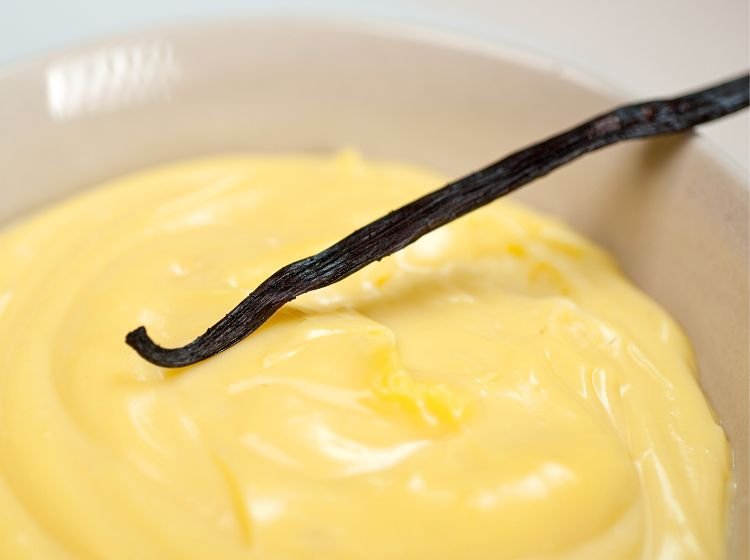
You can also make vanilla tea-infused ice cream or custard by steeping the tea in milk or cream before churning.
Incorporating vanilla tea into your baked goods is a simple yet effective way to impress your guests, adding an unexpected and delightful twist to their favorite treats.
Drinks and Cocktails
Vanilla tea isn’t just for desserts – it can also enhance your beverage game.
Start by steeping vanilla tea and adding it to your morning coffee. This addition will provide a gentle introduction to the day, with the soothing aroma of vanilla and the familiar taste of your favorite brew.
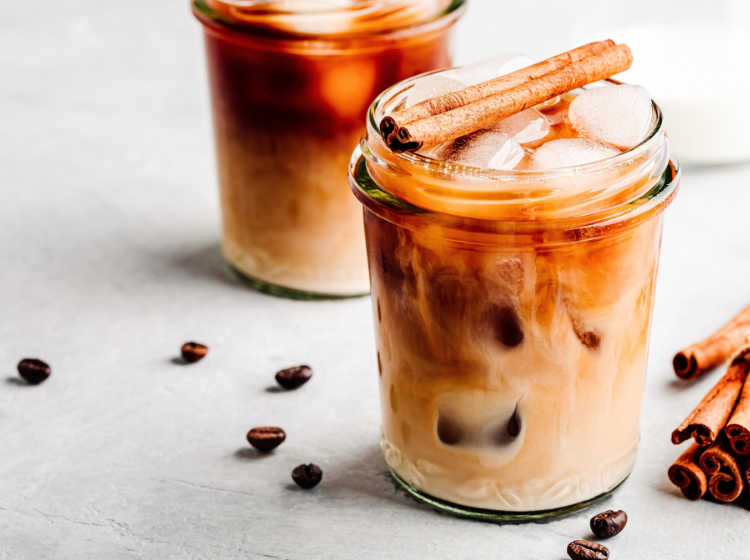
Mixing the two can create an indulgent, creamy latte without needing a trip to the coffee shop!
For those who enjoy cocktails, consider adding brewed vanilla tea to your alcohol selection. The aromatic infusion can balance the flavors of different spirits and liqueurs, creating unique and labor-intensive drinks. You may even design a custom signature cocktail for special occasions or gatherings.
As you explore the various ways to incorporate vanilla tea into your food and beverages, remember that moderation is key. Be mindful of the serving sizes, particularly when using the tea in desserts and cocktails to not overpower the taste with vanilla flavor.
So, the next time you want to indulge in a warm and soothing cup of tea, consider trying out vanilla tea.
Drinking this delicious and natural beverage can be an effective step toward enhancing your overall well-being. Include vanilla tea into your daily routine, and you are setting yourself up for a happier and more relaxed day.
And every time you take a sip, remember that you will not only be enjoying the alluring taste of vanilla tea but also its numerous health benefits!

